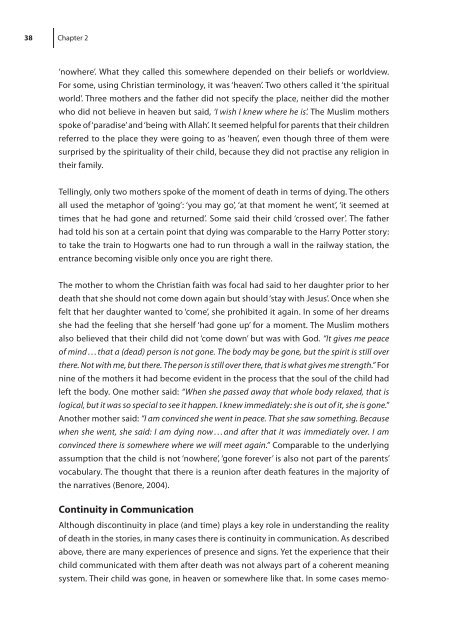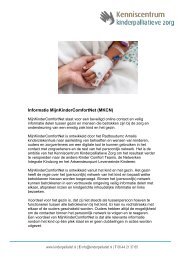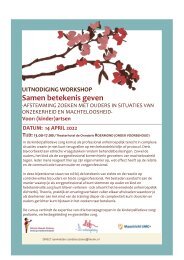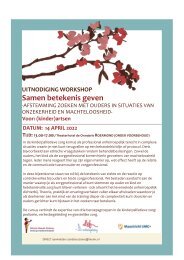Unveiling a fragile spirituality: Experiences of connectedness in pediatric palliative care
Create successful ePaper yourself
Turn your PDF publications into a flip-book with our unique Google optimized e-Paper software.
38 Chapter 2<br />
‘nowhere’. What they called this somewhere depended on their beliefs or worldview.<br />
For some, us<strong>in</strong>g Christian term<strong>in</strong>ology, it was ‘heaven’. Two others called it ‘the spiritual<br />
world’. Three mothers and the father did not specify the place, neither did the mother<br />
who did not believe <strong>in</strong> heaven but said, ‘I wish I knew where he is’. The Muslim mothers<br />
spoke <strong>of</strong> ‘paradise’ and ‘be<strong>in</strong>g with Allah’. It seemed helpful for parents that their children<br />
referred to the place they were go<strong>in</strong>g to as ‘heaven’, even though three <strong>of</strong> them were<br />
surprised by the <strong>spirituality</strong> <strong>of</strong> their child, because they did not practise any religion <strong>in</strong><br />
their family.<br />
Tell<strong>in</strong>gly, only two mothers spoke <strong>of</strong> the moment <strong>of</strong> death <strong>in</strong> terms <strong>of</strong> dy<strong>in</strong>g. The others<br />
all used the metaphor <strong>of</strong> ‘go<strong>in</strong>g’: ‘you may go’, ‘at that moment he went’, ‘it seemed at<br />
times that he had gone and returned’. Some said their child ‘crossed over’. The father<br />
had told his son at a certa<strong>in</strong> po<strong>in</strong>t that dy<strong>in</strong>g was comparable to the Harry Potter story:<br />
to take the tra<strong>in</strong> to Hogwarts one had to run through a wall <strong>in</strong> the railway station, the<br />
entrance becom<strong>in</strong>g visible only once you are right there.<br />
The mother to whom the Christian faith was focal had said to her daughter prior to her<br />
death that she should not come down aga<strong>in</strong> but should ‘stay with Jesus’. Once when she<br />
felt that her daughter wanted to ‘come’, she prohibited it aga<strong>in</strong>. In some <strong>of</strong> her dreams<br />
she had the feel<strong>in</strong>g that she herself ‘had gone up’ for a moment. The Muslim mothers<br />
also believed that their child did not ‘come down’ but was with God. “It gives me peace<br />
<strong>of</strong> m<strong>in</strong>d . . . that a (dead) person is not gone. The body may be gone, but the spirit is still over<br />
there. Not with me, but there. The person is still over there, that is what gives me strength.” For<br />
n<strong>in</strong>e <strong>of</strong> the mothers it had become evident <strong>in</strong> the process that the soul <strong>of</strong> the child had<br />
left the body. One mother said: “When she passed away that whole body relaxed, that is<br />
logical, but it was so special to see it happen. I knew immediately: she is out <strong>of</strong> it, she is gone.”<br />
Another mother said: “I am conv<strong>in</strong>ced she went <strong>in</strong> peace. That she saw someth<strong>in</strong>g. Because<br />
when she went, she said: I am dy<strong>in</strong>g now . . . and after that it was immediately over. I am<br />
conv<strong>in</strong>ced there is somewhere where we will meet aga<strong>in</strong>.” Comparable to the underly<strong>in</strong>g<br />
assumption that the child is not ‘nowhere’, ‘gone forever’ is also not part <strong>of</strong> the parents’<br />
vocabulary. The thought that there is a reunion after death features <strong>in</strong> the majority <strong>of</strong><br />
the narratives (Benore, 2004).<br />
Cont<strong>in</strong>uity <strong>in</strong> Communication<br />
Although discont<strong>in</strong>uity <strong>in</strong> place (and time) plays a key role <strong>in</strong> understand<strong>in</strong>g the reality<br />
<strong>of</strong> death <strong>in</strong> the stories, <strong>in</strong> many cases there is cont<strong>in</strong>uity <strong>in</strong> communication. As described<br />
above, there are many experiences <strong>of</strong> presence and signs. Yet the experience that their<br />
child communicated with them after death was not always part <strong>of</strong> a coherent mean<strong>in</strong>g<br />
system. Their child was gone, <strong>in</strong> heaven or somewhere like that. In some cases memo-


















